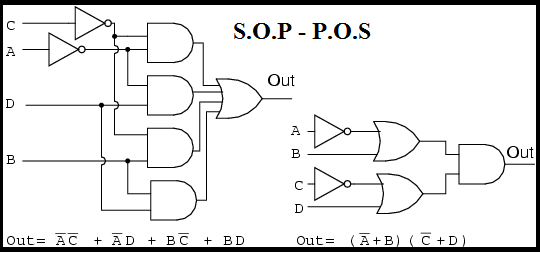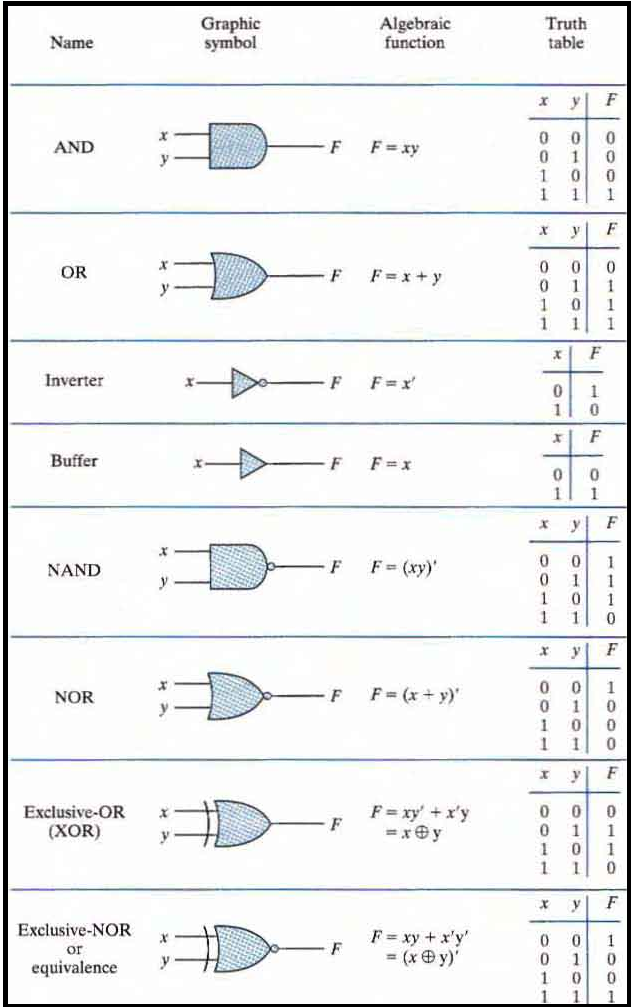Conversion between Canonical Forms
The complement of a function expressed as the sum of minterms equals the sum of minterms missing from the original function.
This is because the original function is expressed by those minterms which make the function equal to 1, whereas its complement is a expressed by those minterms for which the function is equal to 0.
So, F(A, B, C) = ∑(1,4,5,6,7)
This function has a complement F'(A, B, C) = ∑(0,2,3) = m0 + m2 + m3
Relationship between minterm and maxterm:
If we take the complement of F' by Demorgans theorem;
F = (m0 + m2 + m3)'
F = m'0 . m'2 . m'3
F = M0 . M2 . M3
F = ∏(0, 2, 3)
So we conclude that, m'j = Mj
General Conversion procedure - Conversion from one canonical form to another.
Interchange the symbols ∑ and ∏
List those numbers missing from original missing from original form
To find the missing terms we consider that the total number of minterms or maxterms is 2n where 'n' is the number of binary variables in the function.
Conversion between Canonical Forms - Truth table method
Solve the conversion from minterm to maxterm: F = xy + x'z
We obtain the truth table as
We use the truth table, to express 'F' as sum of minterms:
F(x,y,z) = ∑ (1,3,6,7)
F(x,y,z) = ∏ (0,2,4,5) (As total minterms are 23 = 8)
| x | y | z | F |
| 0 | 0 | 0 | 0 |
| 0 | 0 | 1 | 1 |
| 0 | 1 | 0 | 0 |
| 0 | 1 | 1 | 1 |
| 1 | 0 | 0 | 0 |
| 1 | 0 | 1 | 0 |
| 1 | 1 | 0 | 1 |
| 1 | 1 | 1 | 1 |
Standard Forms
The Sum Of Products is a Type of Standard form. It is a Boolean expression containing AND terms called product terms with one or more literals each. The sum denotes the ORing of these terms.
Example: F1 = y' + xy + x'yz'
A Product of Sums is a Boolean expression containing OR terms called sum terms. Each term may have any number of literals. The product denotes the ANDing of these terms.
Example: F1 = x.(y'+z).(x'+y+z')

OTHER LOGIC OPERATIONS
There are 16 possible functions which are used in boolean algebra which include AND, OR.
Two functions Inhibition and implication are not commutative or associative and thus are impractical to use as standard logic gates. Eight are used as standard gates in digital design, these are Complement, Transfer, AND, OR, NAND, NOR, Exclusive OR and Equivalence.
A buffer produces the transfer function but does not produce a logic operation since the binary value of the output is equal to the binary value of the input. This circuit is used for power amplification of the signal and is equivalent to two inverters connected in cascade.
All gates shown above can be extended for more than two inputs except Buffer and inverter A gate can be extended to have multiple inputs if the binary operation it represents is commutative and associative.
| Boolean functions | Operator symbols | Name | Comments |
| F0 = 0 | - | Null | Binary constant 0 |
| F1 = xy | x.y | AND | x and y |
| F2 = xy' | x/y | Inhibition | x but not y |
| F3 = x | - | Transfer | x |
| F4 = x'y | y/x | Inhibition | y but not x |
| F5 = y | - | Transfer | y |
| F6 = xy' + x'y | x⊕y | Exclusive or | x or y but not both |
| F7 = x + y | x+y | OR | x or y |
| F8 = (x+y)' | - | NOR | NOT OR |
| F9 = xy + x'y' | (x⊕y)' | equivalence | x equals y |
| F10 = y' | y' | complement | not y |
| F11 = x + y' | x⊂y | implication | if x then y |
| F12 = x' | x' | complement | not x |
| F13 = x' + y | x⊃y | implication | if x then y |
| F14 = (xy)' | - | NAND | Not-AND |
| F15 = 1 | - | Identity | Binary constant 1 |

Points to Remember
The NAND and NOR functions are commutative and so their gates can be extended to have more than two inputs, however they are not associative.
Exclusive-OR is an odd function which means it is equal to 1 if the input variables have an odd number of 1's.
An integrated circuit is a silicon semiconductor crystal (chip) containing the electronic components for constructing digital gates.
Digital IC's are categorized by number of logic gates in the single package:
Small scale integration: Number of gates is fewer than 10.
Medium scale integration:Number of gates is 10 - 1000.
Large scale integration:Number of gates is in 1000's.
Very large scale integration:Number of gates is in 100000's.